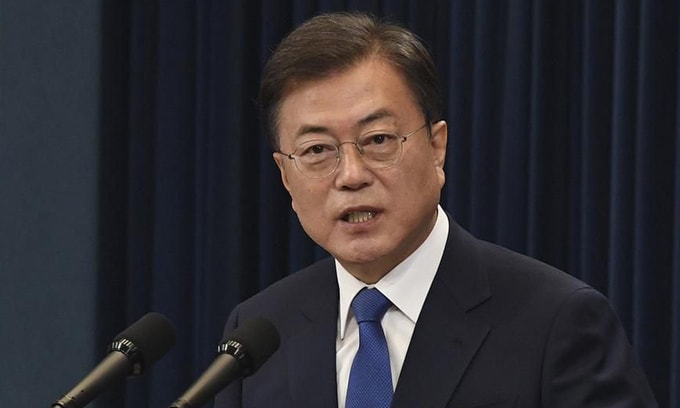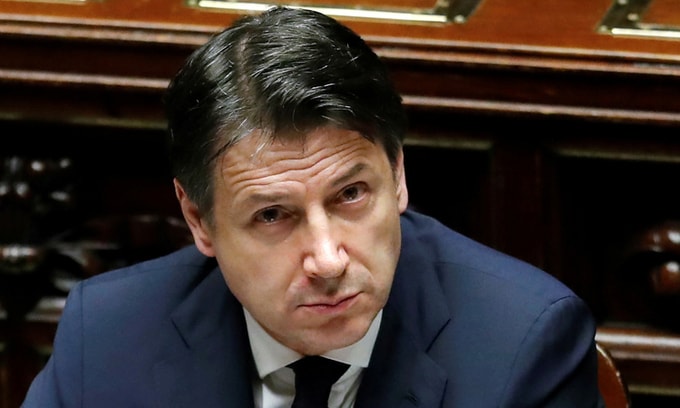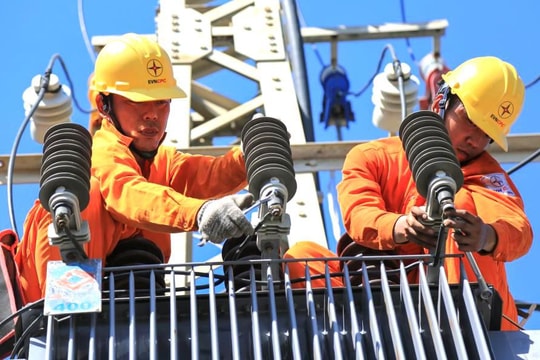World leaders increase power amid Covid-19
From countries that effectively fight Covid-19 to large epidemic areas, many world leaders are supported and trusted by the people for their handling of the crisis.
In countries that quickly contained the pandemic, some leaders have won, or regained, the trust of voters, such as South Korean President Moon Jae-in and German Chancellor Angela Merkel. The outbreaks came at a time when the brightest days of their terms seemed behind them.
President Moon faced calls to resign last year amid sluggish economic growth and a growing number of political scandals in South Korea. Hundreds of thousands signed a petition calling for his impeachment. Meanwhile, in Germany, Ms. Merkel, who is under pressure to hand over power, announced that she will retire in 2021, after about 15 years in power.
Both Moon and Merkel’s initial responses to Covid-19 were criticized. The German chancellor hesitated for weeks to impose strict restrictions. But after they began to act decisively, Germany and South Korea emerged as effective models of containment in the region.
 |
| South Korean President Moon Jae-in speaks at the Blue House in Seoul on May 10. Photo: Reuters. |
South Korea has pursued a strategy of relentless testing and contact tracing, which Germany has also adopted, rather than imposing a complete lockdown. As a result, Germany’s coronavirus death toll is only a quarter of Italy’s despite its larger population. South Korea’s death rate is also quite low, with 260 deaths out of nearly 11,000 cases.
Merkel's approval rating rose to 68% this month, up from 53% in February. According to a recent poll by the Infratest Dimap research institute, about 67% of Germans expressed confidence in the government's handling of the pandemic.
Last month, Mr. Moon’s ruling Democratic Party won a landslide victory in parliamentary elections, winning 180 of the 300 seats, up from 120. Voter turnout was 66.2%, higher than any parliamentary election since 1992, according to the National Election Commission.
Public support for New Zealand Prime Minister Jacinda Ardern has also increased, after her government imposed a strict lockdown to prevent the spread of Covid-19 in late March. The country recorded several days without new cases last week. According to a survey by the Colmar Brunton organization on April 20-21, 87% of respondents approved of Ms. Ardern's handling of the pandemic.
Despite signs that public confidence could help Ardern’s overall approval rating as prime minister, another pollster urged caution. “Natural disasters and wars are often good for governments, but their impact can fade quickly,” it said.
According to commentator Rick Noack ofWashington Post, this warning may also be true forleader ofCountries that failed to prevent serious outbreaks of the pandemic, but their credit ratings still increased,including the UK. Although the number of deaths from nCoV in this country is the second highest in the world after the US, Prime Minister Boris Johnson still maintains influence with the public of this country.
"Nobody wants to say outright that Johnson's hospitalization for coronavirus was a blessing, but it is true," said Tim Bale, a politics professor at Queen Mary University of London. The British Prime Minister contracted coronavirus in late March and was treated in intensive care, before recovering and returning to office.
Bale explained that this development has helped Johnson gain significant sympathy, despite previously being heavily criticized for being too slow to respond to the lockdown, providing personal protective equipment, as well as contact tracing and monitoring.
Recent polls show Johnson's approval ratings remain high. However, Britons appear to be losing confidence in certain aspects of the government's handling of the crisis. Bale said these disagreements demonstrate that "things can go very quickly and very badly", as pressure from the opposition Labour Party mounts on Johnson's government.
Meanwhile, in the US, the majority of people do not support the way President Donald Trump responds to the pandemic, with 54% of respondents to a survey last month by the University of Maryland and the Washington Post giving a negative assessment.
 |
| Italian Prime Minister Giuseppe Conte during a parliamentary session on Covid-19 in Rome on April 21. Photo: Reuters. |
But views of Trump are largely partisan, with most Republicans still backing his efforts. According to a Gallup poll last month, Trump’s overall approval rating was still 49%, 9 points higher than his average for the entire term.
Italian Prime Minister Giuseppe Conte, who has also handled one of the world's largest outbreaks, seems to have had it easier than Trump and Johnson. His approach to Covid-19 has been praised, even though Italy was once the epicenter of the crisis in Europe.
Conte’s political career was said to have been on the brink of collapse. He resigned in August 2019 after the ruling coalition fell apart amid the rise of the far-right faction of Deputy Prime Minister Matteo Salvini, but was reappointed by President Sergio Mattarella nine days after submitting his resignation.
But when Covid-19 broke out, it was not Salvini who Italian politicians supported, but Conte. According to the results of a survey on May 5, 59% of respondents said they trusted the Italian Prime Minister, up about 20% since he ordered a nationwide lockdown two months ago, considered the first harsh response from the West.
But Italy’s long and difficult exit from lockdown appears to be wearing on the patience of the public. Some local politicians and the opposition have opposed Conte’s plan, calling for a faster reopening than the roadmap outlined. Polls show that confidence in the prime minister is starting to wane.
Experts say voters tend to rally around leaders in times of crisis, helping them consolidate power. However,There are exceptions, like Brazilian President Jair Bolsonaro., who once called Covid-19 a media "hoax." More and more people are angry with his government.
The opposition has criticized Bolsonaro for underestimating or deliberately ignoring Covid-19, while Brazil has the largest outbreak in Latin America, with more than 190,000 cases and more than 13,000 deaths. Because the country has conducted far less testing than most other countries, the number of infections and deaths in the country is likely significantly higher than the statistics.
Bolsonaro is not the only leader whose approval rating has been hit by Covid-19. After Japan’s coronavirus cases spiked last month, criticism of Prime Minister Abe Shinzo has also escalated over low testing and conflicting advice. A daily survey by the Mainichi Shimbun and other polls showed that disapproval of the Japanese government’s handling of the pandemic exceeded 50% between March and April.
However, the number of new daily infections in Japan is on the decline. Elections are scheduled for next year, so Abe's party is believed to still have time to prove its ability. Meanwhile, in the US, Trump has less than 6 months to achieve the same goal.




.jpg)
![[Infographics] 5 biện pháp phòng, chống dịch COVID-19 [Infographics] 5 biện pháp phòng, chống dịch COVID-19](https://bna.1cdn.vn/thumbs/540x360/2025/05/22/anh-2.jpg)

-5b8619d675cc4f38cedd8c853332ddab.jpg)
